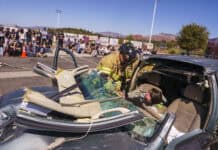Many people driving by the Sedona Campus of the Verde Valley Medical Center on Highway 89A think it’s only an emergency room; the place to go after a sudden injury when a family’s primary physician can’t be reached.
The comprehensive 24/7 medical operation provides a physician-staffed ER assisted by registered nurses trained in advanced cardiac life support, pediatric advanced life support and advanced trauma life support.
In addition, the center offers a 16-slice CT scanner, a laboratory and ground and air transport to other medical centers in Arizona when needed.
By Susan Johnson
Many people driving by the Sedona Campus of the Verde Valley Medical Center on Highway 89A think it’s only an emergency room; the place to go after a sudden injury when a family’s primary physician can’t be reached.
The comprehensive 24/7 medical operation provides a physician-staffed ER assisted by registered nurses trained in advanced cardiac life support, pediatric advanced life support and advanced trauma life support.
In addition, the center offers a 16-slice CT scanner, a laboratory and ground and air transport to other medical centers in Arizona when needed.
What most people don’t know is that there’s much more behind those sliding glass doors.
Perhaps one of the least-known components is its state-of-the-art cancer center catering to patients from every corner of the Verde Valley, and some who come daily from Prescott and as far away as Chino Valley.
Jeff Axtell, M.Ed., is the director of oncology at the Cancer Center of Sedona and the administrator of the entire facility.
“We have a multidisciplinary staff, offering both medical and radiation oncology,” Axtell said.
In addition to its certified oncologists, the center employs oncology certified nurses, nutritionists, social workers and radiation therapists.
“Consumers are very savvy these days — they do their homework to see who has the latest technology and support,” Axtell said. “Our patients come for the advanced technology we provide as well as for the complementary services we offer.”
One the most unusual services provided by the cancer center is a van and driver, providing door-to-door service for the patients, offering pick up and delivery to appointments at VVMC.
Other luxuries are the massage therapist who has hours at the center once a week and an impressive array of artwork provided for those who find it comforting and inspirational.
In terms of technology, Axtell said the cancer center is near the very top compared with other centers in Arizona.
“We use intensity modulated radiation therapy for specific types of cancer, particularly for those with prostate and head and neck cancers,” Axtell said.
IMRT includes sophisticated equipment using beams that can be configured into exceedingly specific and an almost infinite variety of shapes that limit exposure to healthy cells while allowing elevated doses to a tumor.
Use of the technology lets technicians avoid certain anatomical structures, including the spine, and provides treatment with far fewer side effects, or, in the instance of prostate cancer, no side effects.
Tumor-targeted chemotherapy is another advanced treatment offered at the center.
“In the past, chemo was something that was either ingested or pumped through a person’s entire system,” Axtell said. “It looked for any fast-growing cells — which is why patients lost their hair. The latest chemo targets just the tumor and spares any cells that aren’t related.”
One of the best ways to survive cancer is to find it early, according to Axtell, who said that the survival rate for women with early detection of breast cancer has risen to 95 percent.
To that end, the center offers three annual screenings.
“We have prostate screenings in September, low cost mammography in October and skin cancer screenings in May,” Axtell said.
During a previous skin cancer screening, staff found a melanoma on one of the participants — on the back of her leg where it would have otherwise gone undetected, unidentified and untreated.
A new service coming on board in October is “Breast Health Navigator,” a form of case management by certified nurses for women who’ve been diagnosed and which will accompany them from their first diagnosis through the entire course of treatment.
“It provides women with a lot of information, descriptions and comparisons of different treatment options and
answers to questions,” Axtell said.
The service will be complemented by a resource center containing post-surgery garments, prostheses and a library.
As a nonprofit, the center offers extended payment plans for those with limited resources and treats patients equally regardless of their ability to pay, never turning away anyone due to a lack of available funds.
Susan Johnson can be reached at 282-7795, ext. 129, or e-mail sjohnson@larsonnewspapers.com


















